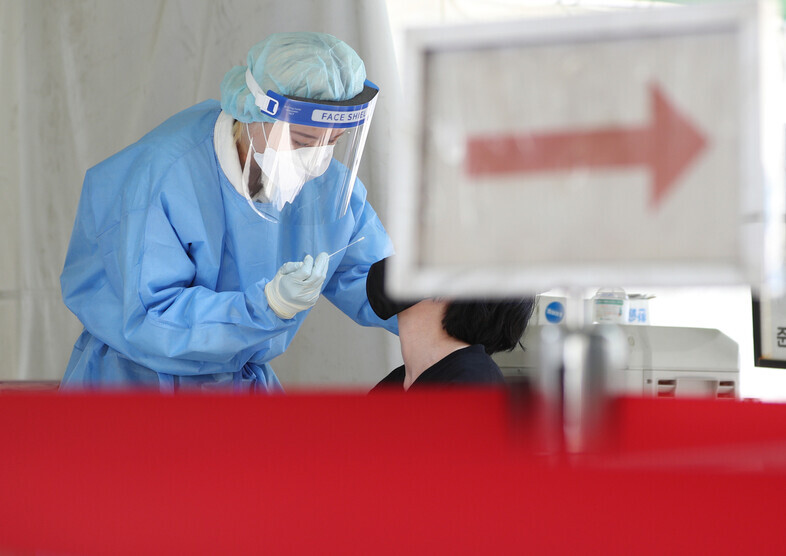hankyoreh
Links to other country sites 다른 나라 사이트 링크
Downgrading COVID-19 emergency, S. Korea will scrap 7-day quarantine for positive cases

The Korean government has decided to downgrade the COVID-19 emergency level by one stage from “critical” to “alert” and removed isolation requirements for confirmed cases, effectively declaring a return to normal from the pandemic.
After sweeping across the world over the past three years, the COVID-19 virus is now reaching the stage of becoming entrenched as an endemic illness akin to the seasonal flu. This decision comes three years and four months after the first confirmed case appeared in Korea on Jan. 20, 2020.
“We have decided to lower the COVID-19 alert level by one stage from ‘critical’ to ‘alert,’ with full-scale application starting in June,” President Yoon Suk-yeol stated in a Cabinet meeting on Thursday. “I am pleased that Koreans can now return to normal life after three years and four months,” he added.
The downgraded alert level will go into effect on June 1. In line with this, the mandatory seven-day self-isolation for those confirmed to be COVID-positive will be reduced to a recommendation to isolate for five days starting in June. Local clinics and pharmacies, which have until now been subject to indoor mask requirements, will now be subject to mask recommendations.
However, the mask mandate will remain in place for medical institutes classified as hospital-level medical institutions where patients tend to cluster, as well as live-in infection-prone facilities such as long-term care facilities.
The weekly preemptive tests required of staff at infection-prone facilities will also switch to a policy of testing only when necessary, such as when staff members exhibit symptoms. Residents will be permitted to eat during face-to-face meetings as long as they follow disease prevention guidelines.
The recommendation for travelers returning from abroad to receive a polymerase chain reaction (PCR) test within three days of entry will also be lifted.
The government’s decision to lower the alert level to “alert” from the highest level of “critical” is effectively a declaration that Korean society is no longer in a state of emergency.
On May 5, the World Health Organization declared the end of the public health emergency of international concern. The Korean government was originally expected to roll back the level of disease control measures in July, but decided to make the change a month early after a comprehensive review of the recent COVID-19 situation.
The degree of risk posed by the virus appears to have lowered in recent times, with average daily COVID-19 deaths of just seven (0.06% fatality rate) over the past month. Although average daily case numbers as high as 30,000-40,000 are expected in early June due to the spread of the XBB variant that accounted for 74.4% of all detected mutations last week, the government believes this is manageable.
Regarding the change, Commissioner Jee Young-mee of the Korea Disease Control and Prevention Agency stated, “This represents the beginning of COVID-19’s transformation into an endemic illness.”
“This is a starting point from which we can switch to a routine system of management,” Jee added.
Financial support for confirmed patients including hospitalization, living expenses, and paid vacation will continue for now along with the operation of screening centers to provide PCR tests for at-risk groups. However, these measures will come to an end when COVID-19’s legal infectious disease status is downgraded by two stages from the current Level 2 to Level 4. The KDCA predicts this to occur in July or August.
By Lim Jae-hee, staff reporter; Bae Ji-hyun, staff reporter
Please direct questions or comments to [english@hani.co.kr]

Editorial・opinion
![[Column] Tariffs on China: Trump was dumb, Biden dumber [Column] Tariffs on China: Trump was dumb, Biden dumber](https://flexible.img.hani.co.kr/flexible/normal/500/300/imgdb/original/2024/0520/191716191153918.jpg) [Column] Tariffs on China: Trump was dumb, Biden dumber
[Column] Tariffs on China: Trump was dumb, Biden dumber![[Column] What if Seoul took reunification by force off the table? [Column] What if Seoul took reunification by force off the table?](https://flexible.img.hani.co.kr/flexible/normal/500/300/imgdb/original/2024/0520/3017161928630494.jpg) [Column] What if Seoul took reunification by force off the table?
[Column] What if Seoul took reunification by force off the table?- [Editorial] Intensifying US-China rivalry means Seoul must address uncertainty with Beijing sooner than later
- [Column] When ‘fairness’ means hate and violence
- [Editorial] Yoon must stop abusing authority to shield himself from investigation
- [Column] US troop withdrawal from Korea could be the Acheson Line all over
- [Column] How to win back readers who’ve turned to YouTube for news
- [Column] Welcome to the president’s pity party
- [Editorial] Korea must respond firmly to Japan’s attempt to usurp Line
- [Editorial] Transfers of prosecutors investigating Korea’s first lady send chilling message
Most viewed articles
- 1Xi, Putin ‘oppose acts of military intimidation’ against N. Korea by US in joint statement
- 2Kim Jong-un wanted to meet with residents of shelled Yeonpyeong Island in South, Moon recalls in mem
- 3For new generation of Chinese artists, discontent is disobedience
- 4Berlin mayor hints at tearing down ‘comfort women’ memorial in city
- 5[Column] What if Seoul took reunification by force off the table?
- 6To weigh costs and benefits, Korea must stop treating US troop presence as a sacred cow
- 7[Column] Tariffs on China: Trump was dumb, Biden dumber
- 8China, Russia put foot down on US moves in Asia, ratchet up solidarity with N. Korea
- 9Putin’s trip to China comes amid 63% increase in bilateral trade under US-led sanctions
- 10[Exclusive] Unearthed memo suggests Gwangju Uprising missing may have been cremated